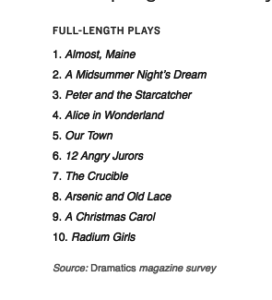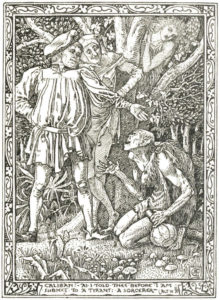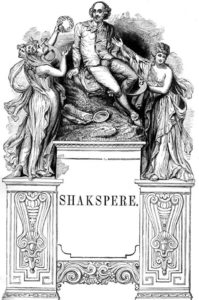You never know where you’ll find a Shakespeare story.
I listen to podcasts at work. Everybody has their own personal style for what they like – educational, informative, short, long, etc… I’ve found that I’m a big fan of the NPR “shows” more than the news. Stuff like Wait Wait Don’t Tell Me, for example.
When you listen to those shows long enough you start to find your favorite guests and realize that you can follow them to other podcasts. Such is the case with Paula Poundstone. I remember watching her do standup years ago, and now I enjoy opportunities to listen to her take on the world around her. Not so much with the technology. Lots of cats.
I recently discovered that she’s got a new podcast along with Adam Felber (also a Wait, Wait regular) called Nobody Listens to Paula Poundstone. It’s fun. Adam asks Paula for her advice on a topic, then they bring in an expert to discuss whether that was good advice. It’s fun and educational.
Anyway, this isn’t a big advertisement for their podcast. I was listening to an episode about cats and Adam mentioned that his cat was named, “Horatio.” I wondered if that was a Hamlet reference. So why not ask? He’s on Twitter, as is Paula.
I asked, “@adamfelber is your cat named Horatio a Hamlet reference? Just heard it mentioned on @paulapoundstone’s new podcast and had to ask.”
And back came the reply! Actually several, which I’ll paste together here.
Brooklyn, 1997. As I was having breakfast in the tiny yard behind our ground floor apartment, three newborn kittens and their mom poked their heads through a hole in the fence and tumbled in…
They hung around and over the next couple of weeks we got to know them. One of them seemed really conflicted and unsure whether to trust us humans or not, so we started calling him Hamlet.
Naturally, the one who seemed outright hostile became Laertes. The mom cat was Gertrude…
…and the sweet, friendly, reliable kitten became Horatio.
(We subsequently met Claudius and learned that Hamlet was in fact Ophelia!)
We took Horatio in soon after that, and he lived with us happily for the next 20 years – like his namesake, the only apparent survivor of that troubled family.
Alas, Horatio has passed on to that undiscovered country from which no feline returns, sung to his rest by flights of mousey angels. But Adam posted a picture! Can cats be good boys? He looks like he was a good boy. I love that “really conflicted” (in a cat, no less) makes some people think, “We should name him Hamlet.”

This story is posted with Adam’s permission. I thought it would be a fun reminder that if you think you see a Shakespeare reference in the wild, go chase it down! You might be right. And you might get introduced to some fun new people. Thanks, Adam! Go check out his new show.


 with my daughter. I discovered a book I’d written on the subject and completely forgotten about.
with my daughter. I discovered a book I’d written on the subject and completely forgotten about. A couple of times recently I saw people asking for advice on how to read Shakespeare. Normally this turns into people telling them that Shakespeare was meant to be performed, not read. So what they should do is to go find a live production of the play they were thinking about reading and watch it instead.
A couple of times recently I saw people asking for advice on how to read Shakespeare. Normally this turns into people telling them that Shakespeare was meant to be performed, not read. So what they should do is to go find a live production of the play they were thinking about reading and watch it instead.